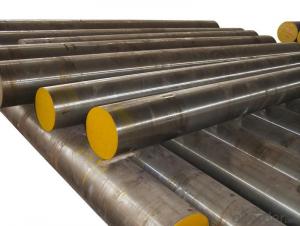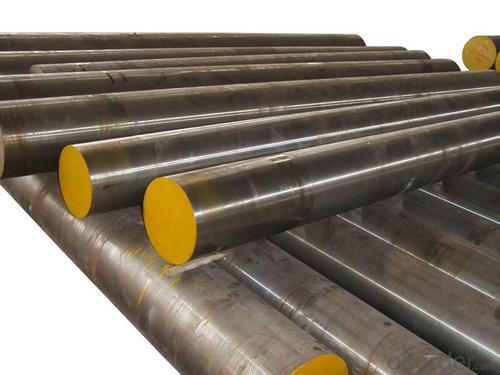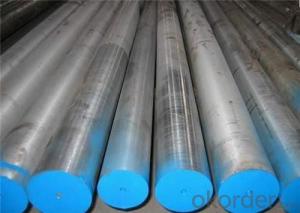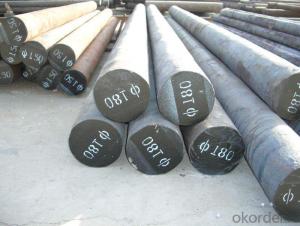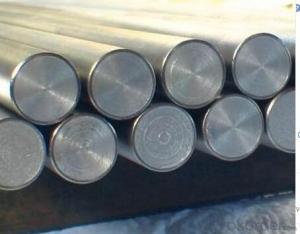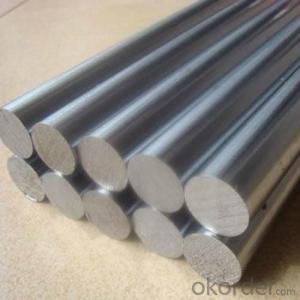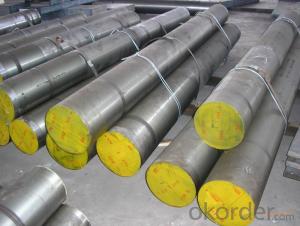Hot-rolled Round Bearing Steel GCr15,100Cr6,SAE 52100
- Loading Port:
- China main port
- Payment Terms:
- TT OR LC
- Min Order Qty:
- 500 m.t.
- Supply Capability:
- 10000 m.t./month
OKorder Service Pledge
OKorder Financial Service
You Might Also Like
Specifications of Hot-rolled Round Bearing Steel GCr15,100Cr6,SAE 52100
1) Grade: Bearing steel SAE 52100 / GCr15 round bars
2) Diameter: 20-500mm
3) Hot rolled/forged, annealed
Application of Hot-rolled Round Bearing Steel GCr15,100Cr6,SAE 52100:
Commom steel used to produce balls and rings of bearing. The product has characteristics of uniform-chemical composition, low percentage of harmful elements, high purity, well-distributed carbide, good surface quality. It also has characteristics of wide scope of plastic,stable heat-treatment quality, uniformand high hardness, high wear resistance,high strength of touching fatigue. It has excellent machining property afer spheroidize annealing.
The use of products The product is used to produce balls and rings of bearing. Future Development By rational rolling and cooling process, the product can be spheroidized on-line and can be used in drawing and machining directly by customers. By combining re-spheroidize annealing and re-crystallisation of semi-finished product, the steel wire process can be simplified.
Packaging & Delivery of Hot-rolled Round Bearing Steel GCr15,100Cr6,SAE 52100
Mark: Heat No. will be cold stamped and Steel grade, diameter (mm), length (mm), and the manufacturer LOGO and weight (kg) is painted.
Standard seaworthy packing or as customer required
Delivery time: Within 30 days after order is confirmed.
- Q: What are the applications of special steel in the aerospace sector?
- Special steel has various applications in the aerospace sector due to its exceptional properties. It is used for manufacturing critical components such as turbine blades, landing gear, and structural parts. The high strength, corrosion resistance, and heat resistance of special steel make it ideal for withstanding extreme conditions experienced during flight. Additionally, its lightweight nature contributes to fuel efficiency and overall performance improvement in aircraft.
- Q: What are the applications of special steel in the food processing industry?
- Special steel is widely used in the food processing industry due to its unique properties. It is utilized for manufacturing various equipment and components that require high strength, corrosion resistance, and hygiene standards. Some applications include the production of food processing machinery, cutting tools, knives, blades, and containers. Special steel ensures durability, cleanliness, and safety, making it an indispensable material in the food processing industry.
- Q: What are the different forging techniques used for special steel?
- Some of the different forging techniques used for special steel include open die forging, closed die forging, and ring rolling.
- Q: What are the different passivation techniques used for special steel?
- There are several passivation techniques used for special steel, including chemical passivation, electrochemical passivation, and mechanical passivation. Chemical passivation involves treating the steel surface with acids or other chemical solutions to remove impurities and create a passive film that protects against corrosion. Electrochemical passivation utilizes an electrical current to enhance the formation of the protective oxide layer. Mechanical passivation involves processes like abrasive blasting or grinding to remove contaminants and improve the surface finish. These techniques are commonly employed to enhance the corrosion resistance and durability of special steel.
- Q: What are the main characteristics of electrical steel?
- Electrical steel, also known as silicon steel or transformer steel, possesses several main characteristics that make it suitable for use in electrical appliances and power equipment. Firstly, electrical steel has a high magnetic permeability, which means it can easily conduct magnetic flux. This property allows it to efficiently transfer electrical energy and reduce energy losses in transformers, motors, and generators. Secondly, electrical steel exhibits low core loss, also known as hysteresis loss and eddy current loss. Hysteresis loss refers to the energy dissipated due to the reversal of magnetic domains within the material, while eddy current loss is caused by circulating currents induced by alternating magnetic fields. The low core loss property of electrical steel enables high energy efficiency and minimizes heat generation in electrical devices. Another important characteristic of electrical steel is its high electrical resistivity. This property reduces the magnitude of eddy currents, further reducing energy losses in electrical equipment. Additionally, electrical steel has a high saturation induction, which refers to its ability to reach maximum magnetic flux density. This characteristic allows transformers and motors to operate at higher magnetic flux densities, resulting in more compact and efficient designs. Furthermore, electrical steel possesses a high mechanical strength, which is crucial for withstanding the stresses and vibrations encountered in electrical devices. It also exhibits good thermal conductivity, enabling efficient heat dissipation and enhancing the overall performance and longevity of electrical equipment. In summary, the main characteristics of electrical steel include high magnetic permeability, low core loss, high electrical resistivity, high saturation induction, high mechanical strength, and good thermal conductivity. These properties make it an ideal material for various electrical applications, providing efficiency, reliability, and performance in power generation, transmission, and utilization.
- Q: Can special steel be used in the construction equipment manufacturing industry?
- Yes, special steel can be used in the construction equipment manufacturing industry. Special steel is known for its high strength, durability, and resistance to wear and corrosion, making it an ideal material for producing heavy-duty construction equipment such as excavators, bulldozers, cranes, and loaders. Additionally, special steel can be customized to meet specific requirements, ensuring the construction equipment meets the necessary performance and safety standards.
- Q: How is special steel used in the power generation industry?
- Special steel is used in the power generation industry for various applications such as turbine blades, generator rotors, and boiler components. These steels possess exceptional strength, corrosion resistance, and heat resistance properties, making them suitable for withstanding high temperatures and pressures in power plants. They help improve the efficiency and reliability of power generation equipment, ensuring safe and uninterrupted electricity production.
- Q: How does special steel perform in terms of machinability?
- Special steel typically has good machinability due to its composition and specific manufacturing processes. It is often designed to have improved cutting and chip formation properties, allowing for easier and more efficient machining operations. This allows manufacturers to achieve high precision and productivity when working with special steel, making it a favorable choice for various applications.
- Q: How does special steel contribute to the efficiency of industrial equipment?
- Several factors contribute to the efficiency of industrial equipment, with special steel playing a crucial role. Firstly, the use of special steel alloys offers superior strength and hardness properties compared to regular steel. This enables the construction of more durable and robust equipment, reducing the frequency of repairs or replacements. Consequently, the overall efficiency of the equipment is improved. In addition, special steel alloys demonstrate excellent resistance to heat and corrosion, making them ideal for use in high-temperature or corrosive environments. This ensures that the equipment can operate reliably, even in challenging settings, without compromising performance or safety. Moreover, special steel alloys provide improved machinability, allowing for more precise manufacturing of industrial equipment components. This precision ensures that the equipment is built to exact specifications, resulting in enhanced overall performance and efficiency. Furthermore, special steel alloys can be tailored to possess specific characteristics, such as high conductivity or magnetic properties. This makes them ideal for applications requiring electrical conductivity or magnetism. By customizing special steel, industrial equipment can be developed to meet specific needs, maximizing efficiency and effectiveness. Overall, the utilization of special steel in industrial equipment significantly enhances its efficiency. Through enhanced strength, durability, heat and corrosion resistance, improved machinability, and customization options, the lifespan, performance, reliability, and safety of the equipment are all improved. Consequently, this leads to enhanced operational efficiency and productivity in industrial settings.
- Q: How does special steel contribute to the electrical industry?
- The electrical industry relies heavily on special steel to produce a wide range of components and equipment required for the generation, transmission, and distribution of electricity. Power transformers, for instance, heavily rely on special steel. These transformers are crucial for adjusting voltage levels in the electricity grid, allowing for efficient transmission and distribution of electricity. Special steel, thanks to its exceptional strength, durability, and magnetic properties, is employed to construct the cores of these transformers. The high magnetic permeability of special steel ensures minimal energy loss during the transformation process, resulting in more efficient power transmission. In addition, special steel is extensively used in the manufacturing of electrical conductors, such as wires and cables. These conductors are responsible for transporting electricity from power plants to various end-use applications. Special steel wires boast excellent conductivity and resistance to corrosion, making them ideal for transmitting electricity over long distances with minimal energy loss. Moreover, special steel is employed in the production of electrical connectors and terminals, ensuring secure and reliable connections between different electrical components. The electrical industry also relies on special steel for the fabrication of electrical motors and generators. The exceptional strength and magnetic properties of special steel contribute to the efficient conversion of electrical energy into mechanical energy, ensuring the smooth operation of motors and generators. Furthermore, special steel is used in the manufacturing of electrical switches, circuit breakers, and other protective devices, guaranteeing the safe and reliable functioning of electrical systems. Overall, special steel plays an indispensable role in the electrical industry by enabling the production of essential components and equipment necessary for the generation, transmission, and distribution of electricity. Its unique properties contribute to enhanced energy efficiency, reliability, and safety in electrical systems, cementing its status as an indispensable material in this industry.
Send your message to us
Hot-rolled Round Bearing Steel GCr15,100Cr6,SAE 52100
- Loading Port:
- China main port
- Payment Terms:
- TT OR LC
- Min Order Qty:
- 500 m.t.
- Supply Capability:
- 10000 m.t./month
OKorder Service Pledge
OKorder Financial Service
Similar products
Hot products
Hot Searches
Related keywords
